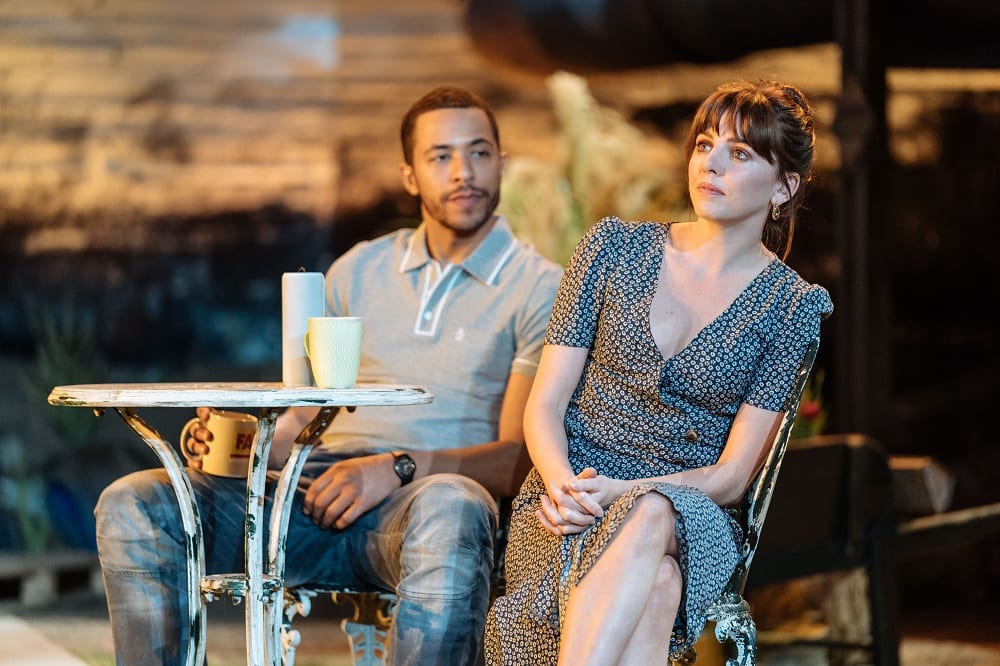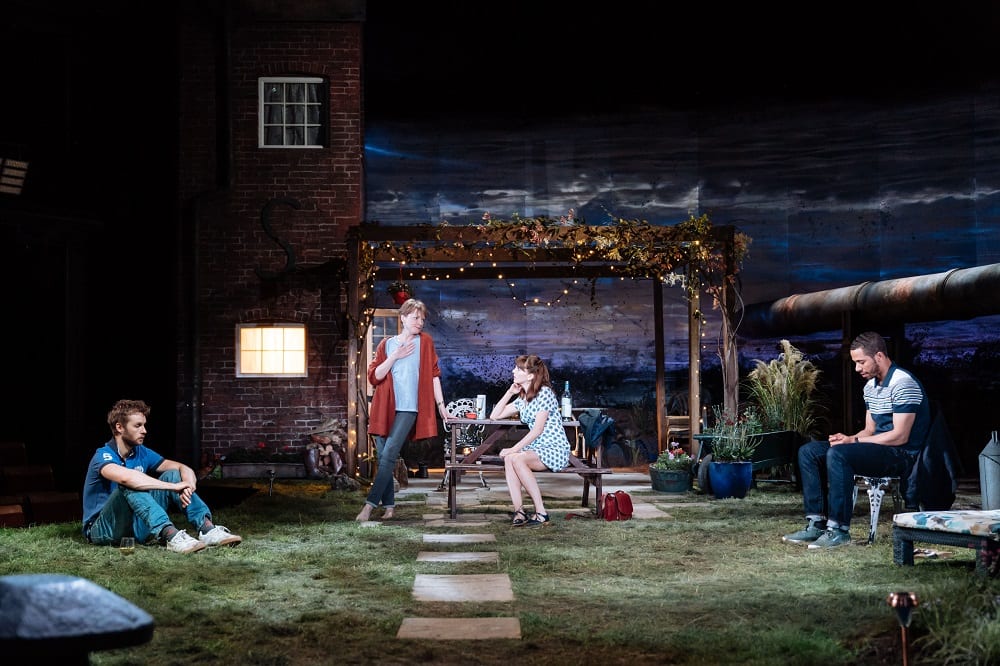Grief, nostalgia and rural decay provide an inescapable atmosphere of paralysis in Barney Norris’s latest play set on a run-down, debt-ridden Hampshire farm.
This is The Bridge’s third production since opening in October and once again its auditorium has been reconfigured, this time to an extended thrust stage (with the audience seated around three sides). Rae Smith’s set depicts both the farm’s attractive natural surroundings and its current state of contaminated disrepair: in the background a painterly panoramic horizon offsets an enormous corporate oil pipe that crudely intersects the stage.
Nightfall begins with twentysomething best mates Ryan and Pete siphoning off oil while Lou (Ryan’s sister and Pete’s ex) looks on unimpressed at their laddish larking about. Returning home early, Ryan and Lou’s recently-widowed mother Jenny is not so much unimpressed as irate. The encounter sparks a series of fraught exchanges that result in Jenny accusing Pete of tearing her family apart following his proposal to Lou.
Excepting a weak, uninspired ending, 31-year-old playwright and novelist Norris combines gentle humour with a sympathetic affinity for his characters. At times expositional speeches feel constructed into conversation, yet Norris makes perceptive observations on loss, nostalgia’s capacity to distort and the extinction of agricultural life. As Ryan points out, they’re chucking chemicals on wheat, not druids living on roots. Meanwhile it becomes increasingly clear that the supportive husband and father Jenny idealises never really existed (there are plenty of Brexit parallels should you go looking for them).
Unlike The Bridge’s thrilling, visceral reimagining of Julius Caesar where audiences experienced being part of the mob as bombs and gunfire rattled around them, here the thrust stage isn’t exploited, the actors rarely venturing forward. In a play that aspires to claustrophobic intimacy, the characters remain at a distance.

Despite the occasional slip in rural accents, all four actors are convincing. Ukweli Roach brings unexpected turns to Pete, a council estate lad and ex-con now with a job offer in Dubai. Sion Daniel Young excels as Ryan, an isolated young man burdened by his father’s death and a job he doesn’t want. Through couched, defensive body language Ophelia Lovibond (a thespian’s name if ever there was one) conveys a young admin worker caught between a sense of fierce familial obligation and a yearning to go her own way. Claire Skinner (Outnumbered) is a force as a manipulative matriarch, though her pernicious sense of selfish self-preservation sometimes feels overplayed. Jenny is a somewhat jarring character. With wine and nibbles nearly always at hand, she appears not to have done a day’s manual labour in her life, idly praising M&S (“you get what you pay for”) and the upmarket drinks brand Fever-Tree.
Here lies a problem. Norris hints at the false freedom of modern society – where people’s thoughts and aspirations are inherited from parents, products, pop lyrics and the places we grow up – yet you rarely feel the family’s financial situation is as perilous as many experience – they do still own a farm after all. For all Norris’ impassioned programme notes concerning exhausting labour conditions and the capitalist system robbing people of their leisure and ability to dream, the characters’ time doesn’t feel stolen so much as wasted. As Gareth Williams’ lyrical strings sound a melancholy motif and Chris Davey’s lighting imperceptibly dims, we luxuriate in a perpetual dusk: the long summer evenings gently blurring into one.
And like these evenings, Nightfall rather drifts away. It’s elegiac and empathetic rather than exacting: a play that ultimately feels curiously conservative.

